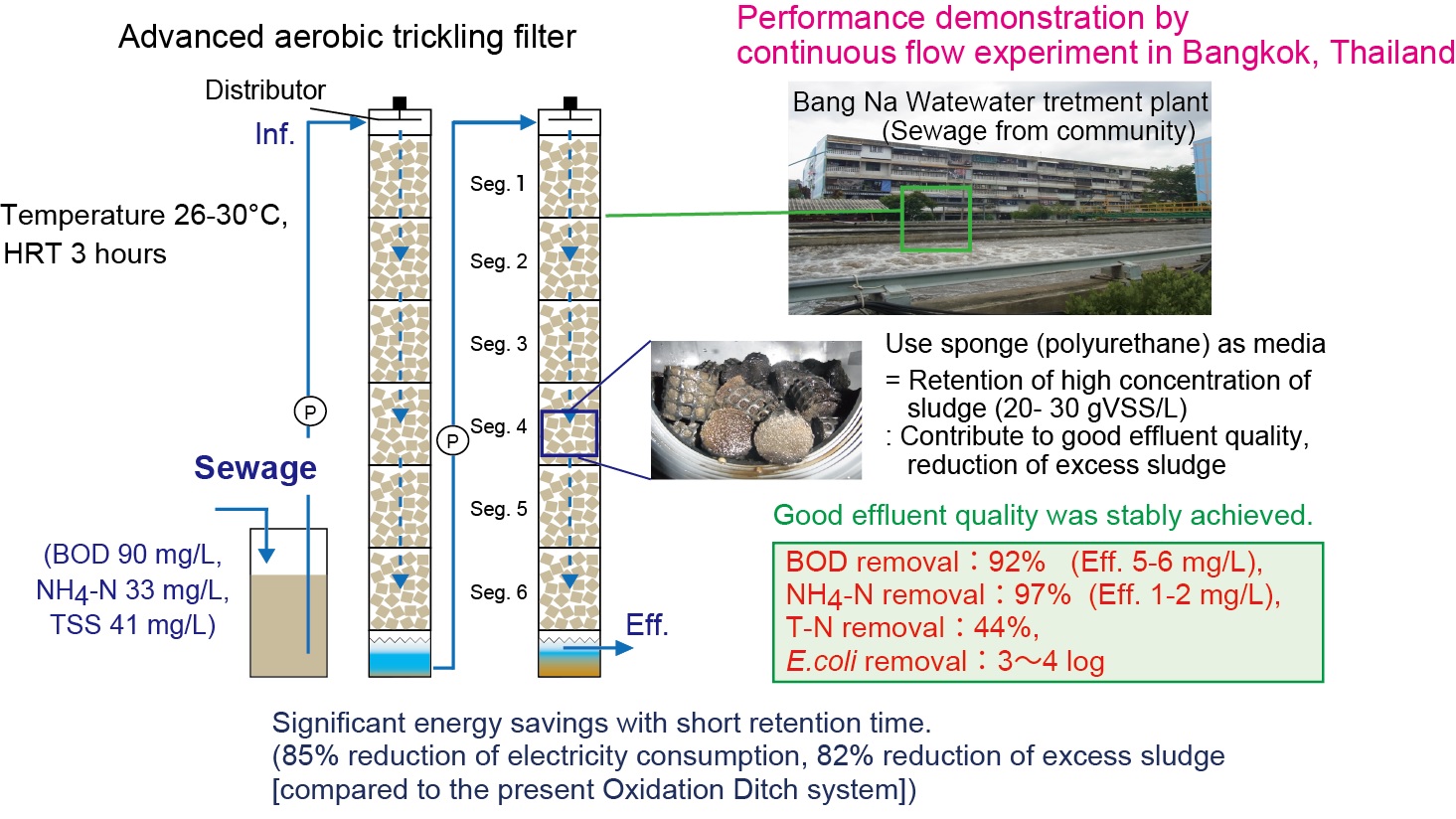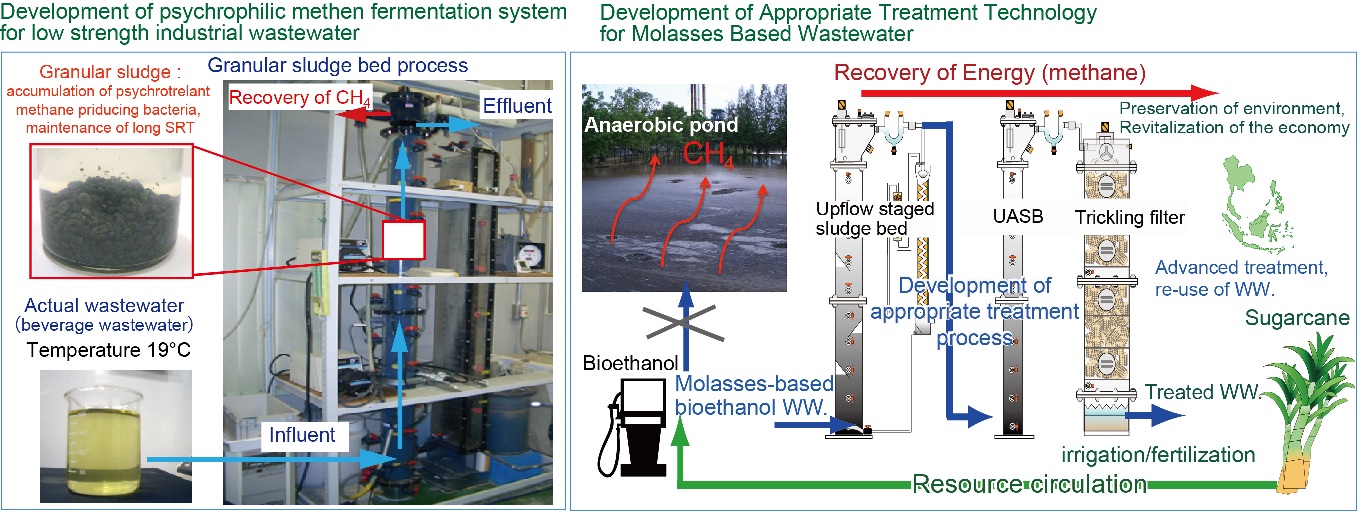Development and demonstration of appropriate wastewater treatment technologies
Principal Investigator (Contact person)
Kazuaki SYUTSUBO (stubo[at]nies.go.jp) "[at] is replaced by @"
- Overall
- Publications & Link
Overall
Short summary
In the current era of sustainable development, energy-saving wastewater treatment systems (such as the methane fermentation process and aerobic trickling filter system) have been shown to be promising technologies for both developed and developing countries. Developing countries in Southeast Asia have problems with surface water pollution by organic wastewater. Furthermore, existing treatment systems (such as anaerobic ponds) cause the emission of greenhouse gas (e.g., methane). Therefore, based on regional characteristics, appropriate technology for sewage treatment was developed and a demonstration of the technology conducted in cooperation with local government (Bangkok Metropolitan Administration). An evaluation of the process performance of an advanced aerobic trickling filter system for decentralized treatment revealed that it achieved sufficient effluent quality together with minimal electricity requirement (85% reduction of electricity consumption). In addition, the development of advanced methane fermentation technology (such as the psychrophilic treatment of low-strength wastewater, treatment of high-strength recalcitrant wastewater, e.g., molasses-based bioethanol wastewater) was undertaken in cooperation with national and international industrial, academic, and governmental organizations. These activities are expected to contribute to the planning for the introduction of measures for an appropriate wastewater treatment technology to conserve regional environments (i.e., conservation of water environment and reduction of energy and greenhouse gases). Furthermore, in order to enable favorable conditions for technological development and realization, NIES held an international workshop on the development of sustainable wastewater treatment technology to share relevant knowledge and elucidate the issues associated with future developments.
Summary
In the current era of sustainable development, energy-saving wastewater treatment system (such as the methane fermentation process and aerobic trickling filter system) have been shown to be promising technologies for both developed and developing countries. The reduction of the energy requirements of the treatment system (operational cost) promotes the dissemination of such technology. Therefore, the development and demonstration of appropriate wastewater technologies were conducted based on the regional characteristics of the wastewater.

Fig. 1 Detail of demonstration of sewage treatment by advanced trickling filter system in Bangkok
Developing countries in Southeast Asia have problems with surface water pollution by organic wastewater (such as domestic sewage and industrial wastewater). Furthermore, existing treatment systems (such as anaerobic ponds) cause the emission of greenhouse gas (e.g., methane). Therefore, in order to develop appropriate technology for sewage treatment in tropical regions, a demonstration of technology was conducted in cooperation with local municipalities (Bangkok Metropolitan Administration: BMA) and academic institutions (King Mongkut’s University of Technology, Thonburi). An aerobic trickling filter system (using a sponge media) was selected as the appropriate technology for the decentralized treatment of sewage and as an immediate specific antipollution measure. A continuous flow experiment of a pilot-scale advanced trickling filter system was conducted for two years at the Bang Na wastewater treatment plant, which receives sewage from the sewer of apartments in Bangkok (Fig. 1). The advanced trickling filter system showed good treatment efficiency with a hydraulic retention time (HRT) of 3 hours at 26-30°C temperature. Water quality of the final treated water (BOD 5-6 mg/L, NH4-N 1-2 mg/L, TSS 3-8 mg/L) met the effluent standards of Bangkok. The retention of high sludge concentration in the sponge media (20-30 gVSS/L-sponge) contributed to the maintenance of good effluent quality and reduction of excess sludge. The electricity consumption and excess sludge production of the demonstrated system were 0.06 kWh/m3 and 0.01 kgTSS/m3, respectively. The trickling filter system achieved an 85% reduction of electricity consumption, 83% reduction of excess sludge, and 89% reduction of space requirement compared with the present treatment system (Oxidation ditch: 0.39 kWh/m3, 0.058 kgTSS /m3, 60 hours retention time). This excellent energy conservation performance (= low maintenance costs) supports the introduction of this type of technology to developing countries. Furthermore, this result could contribute to the planning of a system by the BMA for the decentralized treatment of sewage in densely populated areas.
Methane fermentation is an anaerobic biological process for the treatment of organic compounds. This process has several attractive features: no requirement for aeration energy, recovery of methane gas as energy, and low excess sludge production. For industrial wastewater treatment, a methane fermentation process using anaerobic biofilm (granular sludge) such as an UASB (Upflow Anaerobic Sludge Blanket) is the primary technology. However, the ranges of both organic concentration and temperature of the wastewater applicable for this system are limited. Therefore, the development of a novel methane fermentation technology (such as the psychrophilic treatment of low-strength wastewater and treatment of high-strength recalcitrant wastewater) is necessary.

Fig. 2 Development of appropriate industrial wastewater treatment technology
To encourage the practical deployment of appropriate wastewater treatment systems, developed as basic technologies by the NIES, a demonstration of the psychrophilic methane fermentation technology was performed with the private sector, and the development and practical renovation of a treatment system for molasses-based bioethanol wastewater (high-strength recalcitrant wastewater) was conducted, in cooperation with an institution in Thailand (Khon Kaen University). In the psychrophilic methane fermentation process, a granular sludge bed system was applied to beverage wastewater and it showed suitable performance (organic removal efficiency and methane recovery) under low-temperature conditions (<20°C). A related patent application was made in order to achieve efficient deployment of the technology.
In order to stabilize the molasses-based wastewater treatment, mixing the treatment with wastewater from a sugar refinery (it discharged from the same factory) was considered. Additionally, advanced treatment of the effluent from the anaerobic process and use of the treated wastewater as a fertilizer and/or irrigation water for sugarcane was evaluated via a field cultivation test (Fig. 2). The mixing of the wastewater contributed to the increase in the treatment efficiency. The treated wastewater was found useful for cultivation of sugarcane in terms of both low risk of emission of greenhouse gas from the field’s soil and effectiveness regarding the growth of the sugarcane.
In the Southeast Asian region, many water-related environmental problems (e.g., pollution of water environments and emission of greenhouse gases) arise due to the lack of diffusion of appropriate wastewater treatment technologies. The NIES has developed wastewater treatment technologies in cooperation with national and international industrial, academic, and governmental organizations (e.g., Thailand, Malaysia, Indonesia, and Vietnam). To enable favorable conditions for technological development and realization, it is necessary to establish an international technological research platform via international industrial-academic-governmental collaboration. The establishment of such a technological research platform would promote the practical use (or development) of these technologies. In this context, NIES held an international workshop on the development of sustainable wastewater treatment technology to share relevant knowledge and highlight the issues associated with future developments. Consequently, the gathering of information regarding the requirements for the deployment of appropriate technology, strengthening of cooperation between local governments and research institutions within each country, and the sharing of information (current situation of wastewater treatment technologies and effluent quality standards) by researchers was achieved.
Publications & Link
Publications
Kubota K., Watanabe T., Yamaguchi T., Syutsubo K. (2015) Characterization of wastewater treatment by two microbial fuel cells in continuous flow operation. Environmental Technology, 37 (1), 114-120.
http://dx.doi.org/10.1080/09593330.2015.1064169
Onodera T., Yoochatchaval W., Sumino H., Mizuochi M., Okadera T., Fujita T., Banjongproo P., Syutsubo K. (2014) Pilot-scale experiment of down-flow hanging sponge for direct treatment of low-strength municipal wastewater in Bangkok, Thailand. Bioprocess and Biosystems Engineering, 37 (11), 2281-2287.
http://dx.doi.org/10.1007/s00449-014-1206-5
Syutsubo K., Onodera T. , Choeisai P., Khodphuvieng J., Prammanee P., Yoochatchaval W., Kaewpradit W., Kubota K. (2013) Development of appropriate technology for treatment of molasses-based wastewater. Journal of Environmental Science and Health, Part A, 48, 1114-1121.
http://dx.doi.org/10.1080/10934529.2013.774661